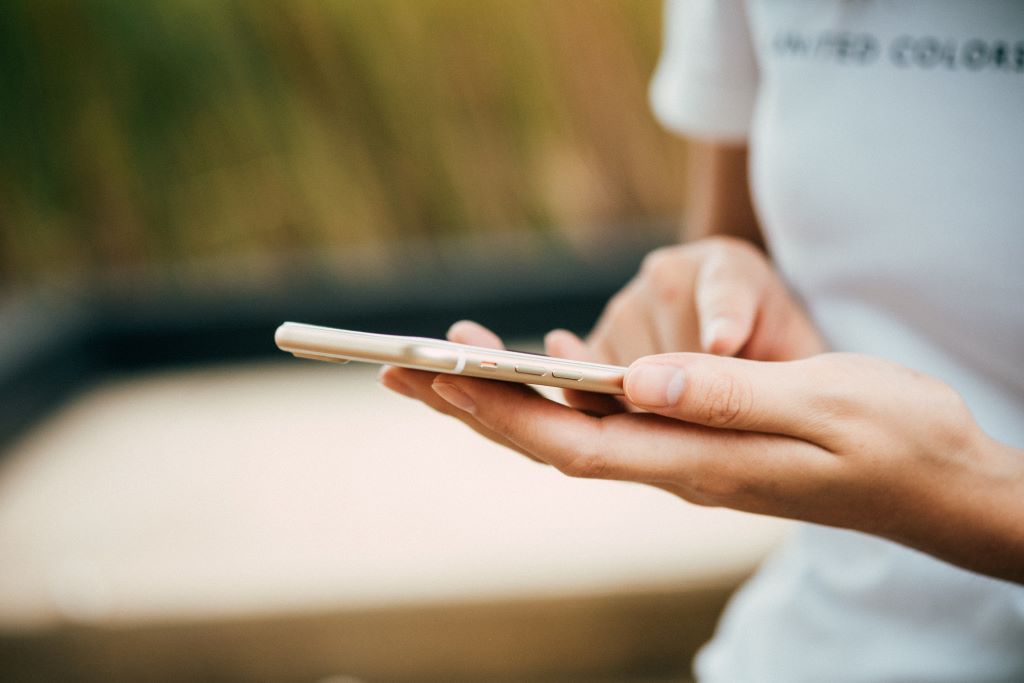
Covid has made people who never worry or who have never experienced anxiety start to suffer from it too. These downloadable anxiety apps can help curb anxiety…
We all go through different phases in life, and suffer ups and downs, some of us take these in our stride and seem to be able to ride the waves without suffering much, many of us however need some help.
To top it all Covid has made people who never worry or experienced anxiety start to also suffer too. Thankfully, there is a lot of help around and Richmond Foundation are doing a great job offering free counselling services, you can call them on 1770. There are also a number of psychologists, and psychiatrists available for private sessions either online or face to face.
For those of us – who might still feel unsure of whether we need therapy or are just going through a few days of turmoil, maybe one of these anxiety apps that have been reviewed by the ADAA (the Anxiety and Depression Association of America) can help temporarily. These anxiety apps have all been reviewed by specialist volunteer mental health professionals with degrees in psychology, medicine, social work, counselling. They are in no way associated with the developers or in the marketing of these anxiety apps. They do the hard work for us, so we won’t have to. There are apps to help with all sorts of mental health issues, from general anxiety to PTSD, OCD, GAD, panic attacks and over worrying – find the one that best suits you and try it out.
Below are a list of their top choices in alphabetical order:
Anxiety Reliever
Anxiety Reliever app is an app that enables users to track anxiety symptoms and provides relaxation exercises. A limited version of the app is available for free and the full app can be bought. https://www.anxietyrelieverapp.com/
AnxietyCoach
Anxiety Coach app is a self-help app that addresses fears and worries using CBT strategies. The app walks you through making a list of feared activities and helps you master them, leading to less fear and worry. The app includes tools for a severity self-test, making a plan, anxiety tracking, and viewing your progress. https://itunes.apple.com/us/app/anxietycoach/id565943257?mt=8
Breathe2Relax
Breathe2Relax app is a simple, intuitive, and attractive mobile app designed by the National Center for Telehealth & Technology to teach breathing techniques to manage stress. The skills taught may be applied to those with anxiety disorders, stress, and PTSD.
This app can be personalized to a pace that the user finds relaxing; includes a video demo, reading materials, and charts to map personal progress. Helpful for self-starters or those working with a therapist to include breathing techniques in their overall treatment. https://itunes.apple.com/us/app/breathe2relax/id425720246?mt=8
CPT Coach
This is targeted at individuals with PTSD who are in active treatment with a trained CPT (cognitive processing therapy) therapist. Designed to be used by the patient in concert with CPT treatment, this app offers a great deal of education about PTSD symptoms and a step-by-step, session-by-session approach to following the assessments that correspond with each of week of CPT treatment. The variety of possible prompts and reminders, from scheduling appointments to reminders for homework, add an additional layer of important structure and predictability often required with treatments for PTSD. http://www.ptsd.va.gov/public/materials/apps/cpt_mobileapp_public.asp
Happify
Happify app is a self-guided app that aims to increase positive emotions through exercises and games supported by positive psychology and mindfulness research. An initial questionnaire is used to suggest “tracks” for an individual’s use, and subsequent activity content is geared towards various aims such as reducing worry, building relationships, increasing fitness, or coping with chronic pain. Activities are backed up with a blurb about research or scientific rationale that the user is encouraged to read. It is free with paid upgrades. https://my.happify.com/
Headspace
Targeted to anyone who wants to learn meditation to reduce anxiety and stress and improve their attention and awareness; good for a beginner to establish a regular meditative routine. The skills taught include mindfulness and cognitive diffusion, breathing exercises, meditation practice, tips for increased relaxation, concentration; may be applied to anxiety and depressive disorders, PTSD, and OCD, especially in conjunction with a health provider.
This Headspace app does a terrific job of describing basic concepts with a creative animated interface, presenting meditation in a user-friendly way with clear instructions; creating an online forum; supplying podcasts; normalizing mind-wandering; and illustrating main points with videos.
This app is not intended as a treatment substitute for those with serious anxiety and related disorders or depression. https://www.headspace.com/headspace-meditation-app
iCBT App
The iCBT app provides a platform to identify, appraise and reappraise negative thoughts. Users are prompted to identify negative thoughts, rate their negative feelings, and identify cognitive distortions. It can be used as a standalone self-help app, however, because there is not psychoeducation or rationale provided, background knowledge in CBT or therapist-assisted delivery are recommended for it to be effective. https://itunes.apple.com/us/app/icbt/id355021834?mt=8
MindShift
Mindshift app is targeted to help adolescents, teens, and young adults gain insight into and basic skills to manage their symptoms of anxiety disorders, including GAD, social anxiety, specific phobias, and panic attacks. It’s also useful for managing worry, performance anxiety, test anxiety, and perfectionism. The skills taught may be applied to individuals with physical, emotional, cognitive, or behavioral manifestations of anxiety, providing users with more helpful, balanced ways of thinking about feared situations.
It does a terrific job of readily offering lists of active coping strategies tailored to the type of anxiety and a variety of methods to manage anxiety; the information and strategies are simple and clear. “Chill out” tools such as breathing exercises, mental imagery, and mindfulness strategies are provided in text and audio format. “Quick Tips” are included to assist with anxiety in the moment. Users can “favorite” the methods that work for them. It is not helpful for people looking to track their symptoms and progress, those easily overwhelmed by many choices, or those with posttraumatic stress disorder (PTSD) or obsessive-compulsive disorder (OCD). https://www.anxietybc.com/resources/mindshift-app
MoodKit
This MoodKit app will help individuals with depression, anxiety disorders, anger management issues, etc. The skills taught include self-monitoring, identifying and changing unhealthy thought patterns, and engaging in mood-enhancing activities.
It does a terrific job at making some of the general concepts of CBT available for people to work on by themselves or with the aid of a therapist. It would not be helpful to those with moderate to severe depression. https://itunes.apple.com/ca/app/moodkit-mood-improvement-tools/id427064987?mt=8
MoodTools
MoodTools app is a self-help app targeting depression. It provides psycho-education about risk factors and psycho-social approaches to treatment, a depression symptom questionnaire (PHQ-9), a thought diary, a suicide safety plan, and videos such as meditation guides. http://www.moodtools.org/
Panic Relief
This Panic Relief app is targeted to help individuals with panic disorder access easy-to-use, empirically supported coping tools to better manage and move through panic attacks.
The free version includes access to progressive muscle relaxation of the arm skill, while the upgrade allows access to the rest of the skills, including square breathing, diaphragmatic breathing, and progressive muscle relaxation. http://cognitivetherapyapp.com/
PE Coach
This PE Coach app is designed for individuals with PTSD, specifically those working with a therapist using prolonged exposure (PE) treatment. The skills taught include education about the treatment, and common reactions to trauma, and breathing retraining.
Not useful as a self-help treatment for PTSD; to get the most out of it, individuals should be in therapy. http://t2health.dcoe.mil/
PTSD Coach
One of two self-help apps from the National Center for PTSD, this PTSD Coach app is targeted to help individuals suffering from PTSD, as well as those simply interested in learning more about this disorder. The skills taught may be applied to individuals with mild to moderate versions of PTSD and for whom self-guided assessment and treatment might be sufficient. It is not recommended for PTSD sufferers who require one-to-one treatment, high-frequency direct clinical interface, or for those who have difficulty make safe decisions.
It does a terrific job of education, assessing PTSD, and offering easy to understand tips to manage common PTSD symptoms, and finding additional treatment resources with providers via a search function. http://www.ptsd.va.gov/public/materials/apps/PTSDCoach.asp
Sanvello
Targeted to help those with anxiety and mood disorders and stress, this Sanvello app teaches deep breathing, behavioral exercises, excises and identifying cognitive distortions (negative thinking patterns), and learning how to replace them with positive thinking patterns. It’s also good for those experiencing bouts of anxiety between treatment sessions. The app does a terrific job of personalizing one’s cause of anxiety using voice recordings, and introducing CBT and reinforcing exercises between therapist appointments. This app is designed to be used in conjunction with therapy, not as a substitute for professional treatment. https://www.sanvello.com
Self-Help Anxiety Management
This is a Self-Help Anxiety Management app designed to help you understand what causes your anxiety, monitor your anxious thoughts and behavior over time, and manage them through self-help exercises and private reflection. The app is targeted to older teens and adults with anxiety disorders. The skills taught may help those with good insight and self-awareness. http://sam-app.org.uk/
T2 Mood Tracker
T2 Mood Tracker app helps individuals track their emotional states and how they change over time for personal insight and accurate reporting to a mental health professional. The skills taught may be applied to individuals with depression, anxiety, stress, trauma-related feelings, any other self-identified emotional states, as well as Traumatic Brain Injury (TBI), chronic pain; customizable for sleep and other issues.
A graphing feature allows visual feedback for long time periods. Few to no interaction or “coaching tips”; links are not useful. http://t2health.dcoe.mil/
What’s My M3
What’s My M3 app gives you your M3 score – a number to help you and your doctor understand if you have a treatable mood disorder. You can monitor your score to see how your mental health is changing over time. This app is targeted to help individuals rate various symptoms of mood disorders to determine the impact it may have on their functioning. This app may help those with major depression, bipolar, anxiety disorders and PTSD quickly determine if they need to speak to their primary care physician about a possible mental health condition that needs treatment. https://itunes.apple.com/ca/app/whatsmym3/id515945611?mt=8
WorryWatch
For individuals with chronic worry, anticipatory anxiety, and GAD, this WorryWatch app provides simple self-monitoring and documenting of worry within a pre-fixed menu, as well as a graphical tool that charts the worry entries by various factors. It also prompts the user to think about whether the he or she believes the actual worry was as bad as what actually happened.
This app was created based on the personal experience of a longtime sufferer of GAD. It is not meant to replace traditional therapy such as CBT, but can be used to supplement it. It is not suited for those who have difficulty interpreting graphical representations of information. It would be helpful to have a tutorial to highlight the features of the app and how to use it. It does a terrific job of displaying evidence of the intensity, frequency, and duration of cognitive distortions. http://worrywatch.com/
For more information you can read the full article here: https://adaa.org/finding-help/mobile-apps
Do you think anxiety apps can help? Have you tried any of the anxiety apps mentioned above? Share your experience with our readers by sending us an email at [email protected]

Francesca Fenech Conti is passionate about social issues and has a BA in Social Policy. She is the Founder and creator of the women only facebook group Women for Women (Malta) and the Women for Women Foundation that works hand in hand with other NGOs and businesses to empower and support women, especially single mothers.
Francesca recently also launched Wham.com.mt to provide a much needed space on the local media scene to promote women’s voices and to provide women with a source of information regarding their general wellbeing.
Click here to check out Francesca’s full bio as well as a list of all her Wham published articles





